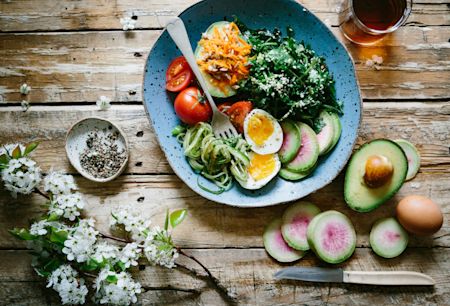Looking ahead to 2026
This year, I want to focus my message on food.
Get an annual subscription to The Body Coach app for just £69.99 (usually £89.99)

In this guest post, Dr Louise Newson discusses what a healthy, balanced diet looks like during perimenopause and menopause.
If you’ve been struggling with nutrition during menopause, you aren’t alone. The knock-on effects of symptoms like fatigue, brain fog and low mood can all influence the food choices you make at this time.
In a survey of almost 5,800 women for my book, The Definitive Guide to the Perimenopause and Menopause, tiredness, stress and a lack of motivation to prepare nutritious meals were the key barriers to eating a balanced diet during the perimenopause and menopause.
Many perimenopausal and menopausal women find that they put on weight more easily. This can be due to a combination of metabolic changes that occur with low hormone levels, reducing exercise, and also women often tell me that they have sugar cravings or are not as motivated to eat well due to their symptoms. Weight changes often improve with some simple changes to your diet as well as taking HRT to replace the missing hormones.
Menopause is a great time to reassess what you eat: I’d never advocate going on a ‘diet’, but I do believe in a balanced diet and everything in moderation, and if you need to, making small, sensible yet significant changes.
Here are some tips on getting started. It is really important that you enjoy food and increase food types (such as adding nuts or seeds, increasing the amount of fruit and vegetables, or eating more Greek or natural yoghurt).
A good starting point is assessing your current eating habits.
The Mediterranean diet isn’t a ‘diet’ per se, but inspired by the way people traditionally eat in coastal Mediterranean countries. It contains plenty of fruits, vegetables, beans, nuts, seeds, whole grains and unsaturated fats such as olive oil. It also includes moderate amounts of dairy foods, eggs, fish, and poultry. There is then a limited amount of red meat and saturated fat, such as butter.
The health of people living in southern European countries has been studied for many years and it’s been found that those who eat a Mediterranean diet have a better life expectancy, lower rate of chronic disease, lower cancer rates and better heart health.
Can it help in menopause? Yes. A review of observational studies and randomised trials on the effects of the Mediterranean diet on menopausal health found that if adhered to long-term, it can reduce cardiovascular disease risk factors, improve bone mineral density (even in women with osteoporosis), prevent against cognitive decline, reduce risk of breast cancer, help prevent cognitive decline and reduce all-cause mortality.
There is also evidence the severity of menopausal symptoms can be reduced by eating a Mediterranean diet. One study found that the intake of legumes and extra-virgin olive oil was associated with lower severity of total menopausal symptoms and psychological symptoms, respectively.
With the increased risk of osteoporosis, maintaining a good calcium intake during perimenopause and menopause is key to support bone health.
You should aim to get all the calcium you need from your diet. Good sources include dairy products, but also calcium-rich foods such as:
Proteins are a key nutrient for energy, help to maintain muscle strength, make and repair cells and support wound healing. Protein helps to keep you fuller for longer between meals by reducing levels of the hunger hormone ghrelin, while boosting levels of the appetite-regulating hormone peptide YY.
During menopause, protein can help boost energy levels, which can be at a low ebb. Current guidelines are that most adults need 0.75g of protein per kilo of body weight per day (about 45g a day for the average woman). That’s about two portions of meat, fish, nuts or tofu a day.
Protein sources include:
Carbohydrates can get a bad press, but some are really important energy sources. Carbohydrates are essential throughout your life, but especially if you are coping with fatigue during menopause.
It is generally best to obtain your carbs from vegetables, which also contain fibre and other nutrients.
The glycaemic index (GI) is a rating system for carbohydrate containing foods based on how quickly each one affects your blood-sugar level. High-GI foods (like sugary foods and white bread) can cause blood-sugar levels to spike and quickly fall, which can lead to cravings and/or overeating.
Low-GI foods, in comparison, are broken down more slowly and cause smaller rises in your blood sugar, keeping you satisfied for longer and encouraging your body to burn fat.
Low GI-foods include: